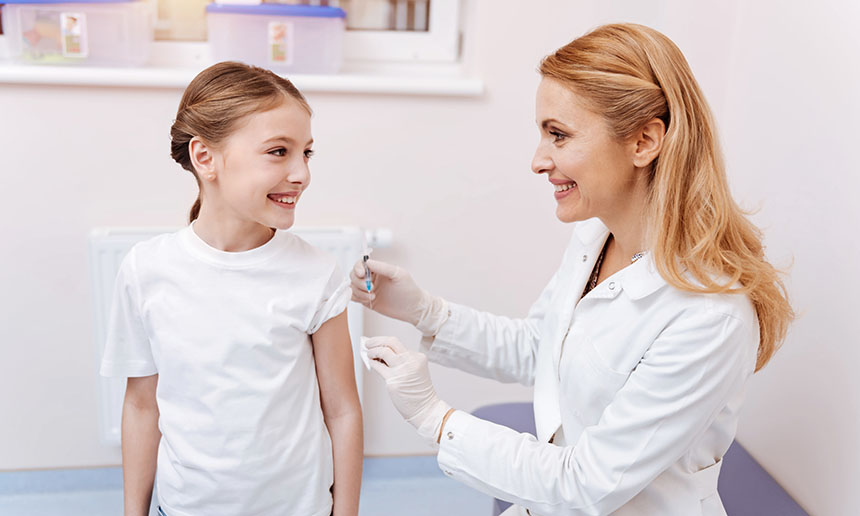Why women should get the HPV vaccine
Published at | Updated at
 This story is brought to you by Grand Peaks Medical and Dental, a multi-specialty, nonprofit, Community Health Center in St. Anthony and Rexburg.
This story is brought to you by Grand Peaks Medical and Dental, a multi-specialty, nonprofit, Community Health Center in St. Anthony and Rexburg.What if there was an immunization that could prevent cancer?
It seems too good to be true, right? But one such vaccination does exist.
The human papillomavirus (HPV) immunization helps protect against a group of viruses linked to multiple types of cancers and other diseases. And although vaccines are a hot debate among parents these days, research shows that the HPV vaccine is helping.
In fact, Tara Ross is one of those people that wouldn’t dream of going without vaccinations that her doctor recommends, including the HPV immunization. She understands the importance of vaccinations in keeping people healthy.
“Vaccines can cause a sore arm for a day – diseases kill.”
She’s a graduate student studying health care at the University of Utah, and she’s passionate about the things she is studying — particularly vaccinations.
That’s why when her doctor told her that she was at the optimal age to be vaccinated for HPV, she knew it was the right decision for her. The 23-year-old, who is originally from Shelley, immediately got the first dose that day.
“Modern medicine exists for a reason,” Ross said. “Vaccines can cause a sore arm for a day – diseases kill.”
In fact, having HPV is the main cause of cervical cancer. However, it is possible to help lower your chances of getting cervical cancer.
Cervical cancer is highly preventable in the bulk of Western countries because of screening tests and a vaccine that prevents HPV infection. Take a look at some background information on the cancer, along with some tips on how to prevent the disease.
What is cervical cancer?
When cells in the body grow out of control it is called cancer. Cancer is always named for the part of the body where it first develops, even if it spreads elsewhere later, according to the Centers for Disease Control. Cervical cancer starts in a woman’s cervix. Fortunately, when the cancer is found early, it is treatable and has a high success rate.
Who is at risk?
All women are at risk for cervical cancer, according to to the CDC. However, it typically occurs in women over 30. Roughly 12,000 American women are diagnosed with the cancer every year, and 4,000 die from it.
Smoking, using birth control for five or more years, giving birth to three or more children, having several sexual partners, and having HIV are all things that can increase your risk of this cancer, according to the Idaho Department of Health and Welfare.
What can I do to reduce my risk of cervical cancer?
There are two tests that help prevent cervical cancer: the Pap smear and HPV test.
A Pap smear detects abnormal cells on the cervix before they become cancerous, said Dr. Jacob Curtis, the medical director for Grand Peaks Medical and Dental.
Women should start getting Pap smears every three years starting at 21 until they are 30, according to Curtis, after which they can be spaced out every five years and done with HPV testing until 65. However, women should still go to the doctor for annual checkups.
The HPV vaccine protects against the types of HPV that often causes cervical, vaginal and vulvar cancers. Health officials recommend it for all girls (and boys) who are 11 to 12 years old, but it can be given as early as 9 until 26. It’s also important to remember that women who get the HPV vaccine still need to have regular Pap smears to screen for cervical cancer, according to https://www.cdc.gov/cancer/cervical/basic_info/prevention.htm.
“Young people have great immune systems that are good at making antibodies,” said Renee Tucker, a registered nurse at Grand Peaks. “They respond very well to the HPV vaccine.”
“I want to do everything I can to protect myself,” Ross said.
Curtis said because of the HPV vaccine, cervical cancer is one of the most preventable.
“The life it saves could be your own,” Curtis said.
Unfortunately, Idaho women rank last in the nation for cervical cancer screenings, the Idaho Department of Health and Welfare says. Three Idaho women are diagnosed with the disease every month.
If you can’t afford a cervical cancer screening, check out this website. Idaho Women’s Health Check Program provides free cervical cancer screenings to low-income and uninsured females in Idaho.
Many health departments and clinics in Idaho, including Grand Peaks, will be hosting an HPV vaccination clinic Feb. 5 to 10. Click here to find out which organizations are participating in the event.
“I don’t think not getting the HPV vaccination hurts anyone but yourself – but just like eating good foods, vaccinations are just another way to prevent diseases,” Ross said. “Vaccinations are a lot cheaper than paying thousands of dollars on chronic diseases.”


